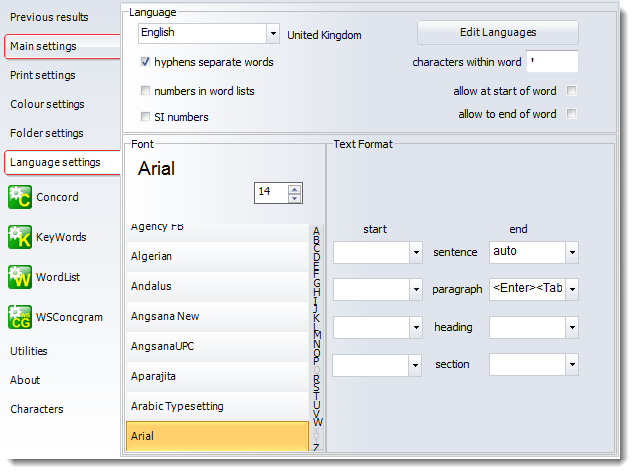Choosing the Language
The point of it …
1. Different languages sometimes require specific fonts.
2. Languages vary considerably in their preferences regarding sorting order. Spanish, for example, uses this order: A,B,C,CH,D,E,F,G,H,I,J,K,L,LL,M,N,Ñ,O,P,Q,R,S,T,U,V,W,X,Y,Z. And accented characters are by default treated as equivalent to their unaccented counterparts in some languages (so, in French we get donne, donné, données, donner, donnez, etc.) but in other languages accented characters are not considered to be related to the unaccented form in this way (in Czech we get cesta .. cas .. hre .. chodník ..)
Sorting is handled using Microsoft routines. If you process texts in a language which Microsoft haven't got right, you should still see word-lists in a consistent order.
Note that case-sensitive means that Mother will come after mother (not before apple or after zebra).
It is important to understand that a comparison of two word-lists (e.g. in KeyWords) relies on sort order to get satisfactory results -- you will get strange results in this if you are comparing 2 word-lists which have been declared to be in different languages.
Settings

Choose the language for the text you're analysing in the Controller under Language Settings. The language and character set must be compatible, e.g. English is compatible with Windows Western (1252), DOS Multilingual (850).
WordSmith Tools handles a good range of languages, ranging from Albanian to Zulu. Chinese, Japanese, Arabic etc. are handled in Unicode. You can view word lists, concordances, etc. in different languages at the same time.
Hyphens separate words, Numbers, Characters within word
How more languages are added
Press the Edit Languages button.
See also: Choosing Accents & Symbols, Accented characters, Processing text in Chinese etc., Text Format, Changing language
